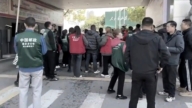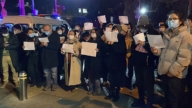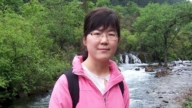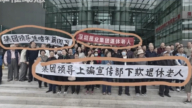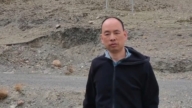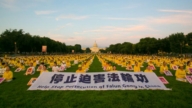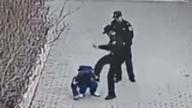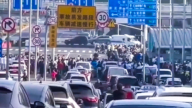【新唐人2015年02月11日訊】內蒙古呼和浩特市中級法院9號對「呼格吉勒圖冤案」真兇趙志紅,作出一審判決,裁定趙志紅故意殺人、強姦、搶劫、盜竊罪成立,並判處死刑。呼格吉勒圖枉背了十幾年的罪名,終於「物歸原主」。案件引發外界思考,為甚麼在中國糾正冤假錯案會這麼困難呢?請看報導。
1996年4月9號,年僅18歲的呼格吉勒圖在當地毛紡廠女廁裡,發現一具被強姦殺害的女屍。之後他主動找到轄區民警報案,卻被認為有作案嫌疑而遭逮捕。當時中共正在進行第二次「嚴打」。在案件證據不足並有多處疑點的情況下,法院在案發後61天內完成一審和終審,並對呼格吉勒圖執行死刑。
18年後,也就是在去年底,呼格吉勒圖才被改判無罪。而真兇趙志紅在上個月5號進行二審,共持續3天,趙志紅在法庭上始終承認,自己就是呼格冤案的真兇。
其實,早在2005年,趙志紅因內蒙古系列強姦殺人案落網時,第一個供認的就是呼格冤案。當時他一共招認了10起命案。但在2006年,呼和浩特中院對趙志紅一審時,檢查機關卻只起訴9起案件,唯獨不提呼格冤案,這甚至遭到趙志紅本人的當庭質疑。
之後,趙志紅的案件審理一直暫停,在9年的時間裏,雖然呼格吉勒圖的父母多次上訪,想為兒子洗冤,案件卻遲遲得不到糾正。
為甚麼在中國,糾正冤假錯案會這麼艱難呢?
曾經在吉林省延邊檢察院,從事刑事公訴工作多年的唐吉田律師分析,這和中國的刑事訴訟制度有關。目前的刑事訴訟制度,嚴格來講,是靠公安的口供定案,因此辦案人員為了獲取口供,可能使用刑訊逼供。而一旦由於所謂的「破案」立功受獎,這些人就會形成利益共同體。
維權律師唐吉田:「最根本的,實際上還是中國這個刑事訴訟制度,它不是以保障人權為核心,而是以所謂的打擊敵人,懲罰犯罪為宗旨,從制度上就有這樣一些空間。因而糾正的話,就不是個別人的阻力,可能是來自於這樣一個評判體系,工作模式,慣性。短期內還沒有看到有明顯的減少。」
著名憲政學者、「天安門民主大學」教務長王天成指出,從小的方面說,是個人錯判不願承擔責任,從大的方面說,有政治上的原因。
「天安門民主大學」教務長王天成:「從大的方面說,共產黨要維持它所謂的表面的面子。它把這個東西往一個更大的,政治上的方向去靠。出了這樣的冤案,它覺得對這個體制是不光彩的,當然它是不光彩的。它要掩蓋這種東西,不願意承認這個錯誤,這個事情就變的比較難,拖的時間比較長。」
當年在嚴打期間被作為「從重從嚴」辦案典型,得到表揚的呼格冤案,在去年當局推行「依法治國」後,再次成為「司法進步」的典型。
王天成:「這是共產黨一貫的做法,它把很多事情換一個說法,通過媒體的運作,就變成好像是給它臉上貼金的事情。實際上,這個事情完全是一個醜聞。」
唐吉田律師認為,所謂「法治進步」,「司法改革」是概念上的混亂。
唐吉田:「第一在中國大陸,其實也不存在嚴格意義上的『司法』,因為在中國,官方更習慣用所謂的『政法』,這是中國的真實寫照。另外,中國也不存在所謂的『法治』,因為目前來講中國仍然是少數人之治,那絕對就不是法治,法治肯定是眾人之治。」
呼格冤案在中國並不是孤立的現象,近年來例如「聶樹斌案」、「趙作海案」、「佘祥林案」等案件頻頻出現,王天成認為,中國媒體報導不自由,無法起到輿論監督作用,也是中國冤假錯案糾正難的原因之一。
採訪/編輯/尚燕 後製/鍾元
Hugejiltu Case Murderer Sentenced to Death
On Feb 9th, Inner Mongolia Hohhot Intermediate People’s
Court made the first instance verdict on real murderer
Zhao Zhihong of the “Injustice Hugejiltu Case" with a ruling
that Zhao Zhihong committed intentional homicide, rape,
robbery and theft, and sentenced him to death.
The unjust charges on Hugejiltu over ten years are
finally “returned to the real culprit".
Such a case has triggered thinking: why is it so difficult
to correct a case of injustice in China? Let’s see the story.
On Apr 9th of 1996, 18-year-old Hugejiltu spotted
a body of a woman who was raped and killed
in the female toilet of a local woollen mill.
Afterwards, he actively reported to the local police
regarding what he found. But he was considered
the criminal suspect and then arrested.
At that time, the Chinese Communist Party (CCP)
was launching for the second time
“Hard Crackdown on Criminal Offences".
Under the circumstances of insufficient evidence
and many doubts, the court finished the first instance
verdict and the final judgement within 61 days,
and executed the death penalty on Hugejiltu immediately.
18 years later, at the end of last year, Hugejiltu was
vindicated as innocent. The true murderer, Zhao Zhihong,
experienced the second instance on Jan 5th,
which lasted for three days.
Zhao Zhihong always admitted in the court that
he was the true murderer in the unjust Hugejiltu case.
In fact, as early as 2005, when Zhao Zhihong was arrested
as the key culprit of a series of rapes and homicide,
his first confession was the Hugejiltu case.
At that time, he confessed to a total of 10 murder cases.
But in 2006, when the Hohhot Intermediate People’s Court
carried out the first Instance of Zhao Zhihong’s case,
the prosecutors indicted him only on nine cases,
with the exception of the Hugejiltu case, which was
even questioned by Zhao Zhihong himself in court.
After that, Zhao Zhihong’s case hearing was
suspended.
During the period of nine years,
although Hugejiltu’s parents repeatedly appealed
to the government for correcting the injustice
to their son, the case had not yet been corrected.
Why should it be so difficult
to correct injustice cases in China?
Lawyer Tang Jitian once involved in criminal
indictment for many years in Yanbian’s Procuratorate
of Jilin Province, said that this is related
to China’s criminal procedure system.
The current system of criminal procedure, strictly speaking,
is to bring a verdict by relying on the oral testimony
of the suspects, obtained
by the public security department.
So in order to obtain confessions, the investigators
of the department may use torture.
Once this so-called “detection" is conferred
with the label of meritorious service, then these people
form a community of interests.
Human rights lawyer Tang Jitian:"Fundamentally, this is still
what the Chinese criminal litigation system is based
on:- the core value of fighting against the enemy
and punishing the criminals rather than the core value
of protecting human rights.
So there is some room existing in the system.
Hence, to correct such a case will face resistance
not only from an individual person,
but also from such an evaluation system,
the operation pattern and the mode of inertia.
In the short term we cannot
see such cases reduced significantly."
Mr Wang Tiancheng is a renowned constitutional scholar,
and the Dean of “University Tiananmen Democracy".
He noted that from a narrow viewpoint,
the individual person is unwilling
to take the responsibility of a case of injustice;
from a wider viewpoint, there are some political reasons.
Wang Tiancheng: “From the wide viewpoint,
the CCP tries to maintain its so-called glazing surface,
which is used for proving its expansion
to a larger and more political direction.
Once such an injustice case is reported,
then the CCP thought this a disgraceful system.
It is of course not glazing. The CCP is going to hide
this kind of thing, do not want to admit the mistake,
and then this thing becomes more difficult
with a lengthened time period."
As a model case in terms of the principle
of “Harsh and Strict" crackdown on criminal offences,
the awarded Hugejiltu injustice once again becomes
another model case for “judicial progress"
after the Chinese authorities promoted
the “rule of law" in the last year.
Wang Tiancheng: “This has been the usual practice
of the CCP, which changes a lot of things
with a new statement, via the operation of the media,
which seem to claim credit for things that are actually given it.
This thing is a complete scandal."
Lawyer Tang Jitian believes that the so-called
“progress of the rule of law" and “judicial reform"
are conceptually confused.
Tang Jitian: “First in China mainland, in fact,
there is no “justice" in the strict sense.
Because in China, the official side is more accustomed
to using so-called" Political and Legal",
as a true portrayal of China.
In addition, there is no so-called “rule of law" in China.
Because the current situation of China’s regime
is still minority rule, it is definitely not the rule of law
as the rule of law must be decided by the people. “
The Hugejiltu injustice case is not an isolated phenomenon
in China in recent years. For example, the “Nie Shubin",
“Zhao Zuohai", “She Xianglin"
and other cases are frequently reported.
Wang Tiancheng believes that Chinese media reports
are not free, so cannot play the role of public opinion
to monitor such cases. This is one of the reasons
why it’s difficult to correct injustice cases in China.
Interview- Edit/sangyan Post-Production/zhongyuan


